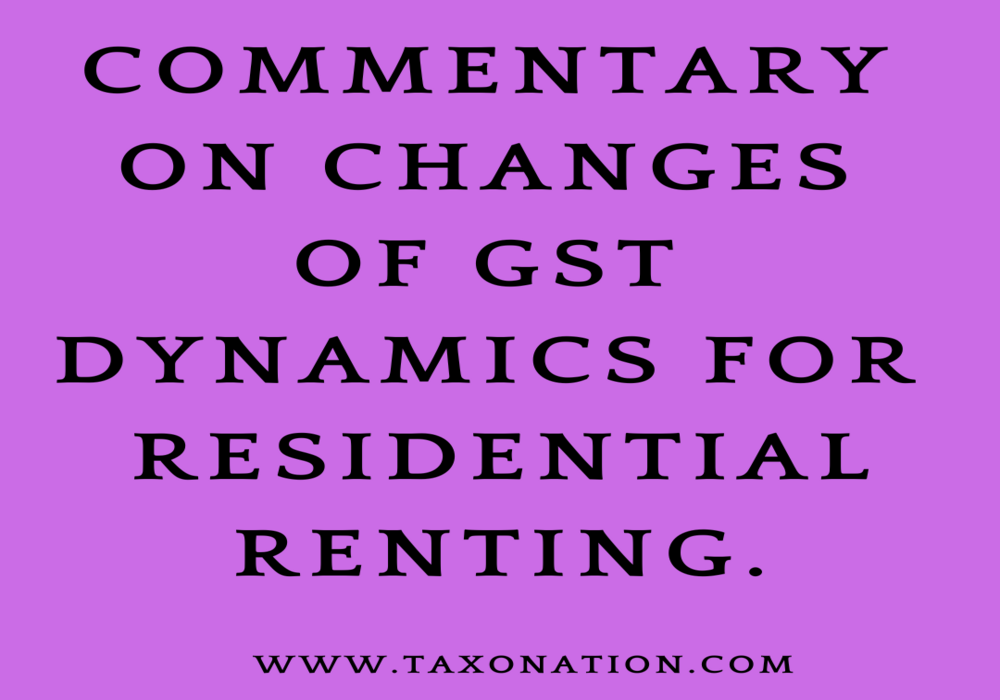
Landlord need to check with their Tenants, on whether they are registered for GST or not - and accordingly apply GST to the Rent amount, as per the below men scenarios.
Owners / Licensors/ Licensees take note:
NEW GST RULE
The dynamics of renting residential property under GST has changed from 18th July 2022. The decision to bring the renting of residential dwellings under the tax net was taken in the 47th GST Council Meeting. Renting an immovable property is considered a supply of service and it attracts GST @ 18% (SAC Code – 9963/9972).
EARLIER
Applicability of GST on residential property up to 17th July 2022
GST was not applicable if the residential property was rented out to any person (whether a registered or unregistered person under GST) up to 17th July 2022.
Liability to pay GST did not arise as it was specifically exempted.
NOW Applicability of GST on residential property w.e.f. 18th July 2022
GST will be applicable if the residential property is rented out to a registered person under GST w.e.f. 18th July 2022 (i.e GST applicable if your Tenant is registered under GST).
Liability to pay GST @ 18% under the reverse-charge mechanism (RCM) will arise on the recipient(Tenant).
GST will NOT be applicable/exempted if the residential property is rented out to an unregistered person under GST w.e.f. 18th July 2022
Analysis of Impacts on Landlords/ Tenants
1. IMPACT on LANDLORD of Residential Property [If the tenant IS registered under GST]
If the supplier (landlord/lessor) is registered under GST, then it will be shown as outward supplies liable to be taxed under the reverse charge mechanism. Liability to pay GST is on the recipient(tenant/lessee) hence no additional GST liability on Landlord. As per section 17(2), there arises no question of availing of the input tax credit as the outward supply is liable to be taxed under RCM.
2. IMPACT on TENANT of Residential Property [If the tenant is registered under GST]
When a tenant is registered under GST and takes a residential property on rent from any person (registered or unregistered person) GST will be applicable under RCM. Liability to pay GST @ 18% will be of the recipient (Tenant/lessee) of service. The recipient will also be able to claim the ITC (Input Tax Credit) of the GST paid under reverse charge if the payment of rent will be a business expenditure and the same is not included in the list of blocked ITC u/s 17(5).
3. IMPACT on LANDLORD if he IS NOT registered under GST
Liability to pay GST is on the recipient(Tenant) hence no additional GST liability or any compliance under GST.
Some Practical Scenarios
Scenario 1
When a Company, LLP, Firm, AOP, BOI, etc takes a residential dwelling for the purpose of residence on rent for employees it will be considered as an item of business expenditure. GST will be paid under RCM and the ITC of the GST paid under reverse charge can be claimed.
This is a tricky issue here- if the expenditure is for furtherance of business, one can claim the ITC - as per authors view otherwise itc becomes in eligible.
Scenario 2
When a Composition dealer who is registered under GST takes a residential dwelling for the purpose of residence on rent then it will be considered as an item of business expenditure. GST will be paid under RCM but the ITC of the GST paid under reverse charge cannot be claimed as per section 10(4) by a composition dealer.
Scenario 3
When an Individual who is registered under GST as a Proprietorship Firm takes a residential dwelling for the purpose of residence on rent for himself/herself/family then it will be considered as an item of personal expenditure and not the business expenditure of a proprietorship concern. GST will be paid under RCM but the ITC of the GST paid under reverse charge cannot be claimed as it is blocked per section 17(1). It is advisable for Individuals to NOT take residential property on rent in the name of the business (Proprietorship Firm) to avoid GST liability.
Scenario 4
When a residential dwelling is taken by a registered person on rent for commercial purpose it will be treated at par with the commercial unit. If the landlord is unregistered then GST shall not be levied and paid by either the landlord or the tenant. If the landlord is registered GST will be charged on forward charge basis and the recipient can take the ITC of the same.
Author- CA Jatin Minocha
Comment: